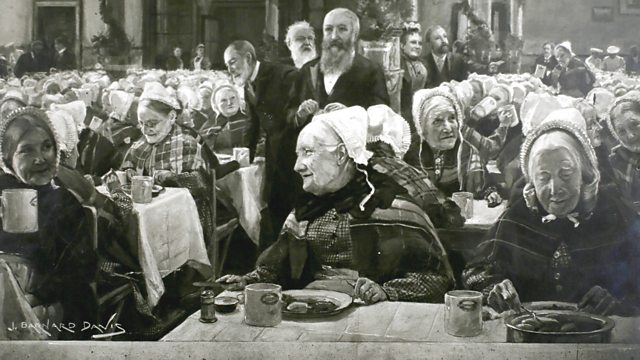The Poor Laws
Melvyn Bragg and guests discuss the 19th century legislation intended to discourage poor people from seeking relief instead of work, with handouts replaced by the workhouse
Melvyn Bragg and guests discuss how, from 1834, poor people across England and Wales faced new obstacles when they could no longer feed or clothe themselves, or find shelter. Parliament, in line with the ideas of Jeremy Bentham and Thomas Malthus, feared hand-outs had become so attractive, they stopped people working to support themselves, and encouraged families to have more children than they could afford. To correct this, under the New Poor Laws it became harder to get any relief outside a workhouse, where families would be separated, husbands from wives, parents from children, sisters from brothers. Many found this regime inhumane, while others protested it was too lenient, and it lasted until the twentieth century.
The image above was published in 1897 as New Year's Day in the Workhouse.
With
Emma Griffin
Professor of Modern British History at the University of East Anglia
Samantha Shave
Lecturer in Social Policy at the University of Lincoln
And
Steven King
Professor of Economic and Social History at the University of Leicester
Producer: Simon Tillotson
Last on
LINKS AND FURTHER READING
��
READING LIST:
Anne Borsay, Disability and Social Policy in Britain since 1750: A History of Exclusion (Palgrave, 2005)
A. Brundage, The English Poor Laws, 1700–1930 (Palgrave, 2002)
Marc Brodie, The Politics of the Poor: The East End of London 1885-1914 (Oxford University Press, 2004)
S. Fowler, Workhouse: The People, The Places, The Life Behind Doors (The National Archives, 2007)
David Green, Pauper Capital: London and the Poor Law 1790-1870 (Ashgate, 2010)
Lynn Hollen-Lees, The Solidarities of Strangers: The English Poor Laws and the People 1700-1948 (Cambridge University Press, 1998)
Peter Jones and S. King (eds), Obligation, Entitlement and Dispute under the English Poor Laws (Cambridge Scholars Press, 2015)
Steve King, Sickness, Medical Welfare and the English Poor 1750-1834 (Manchester University Press, 2018)
Steve King, Poverty and Welfare in England 1700-1850: A Regional Perspective (Manchester University Press, 2000)
Marjorie Levine-Clark, Unemployment, Welfare, and Masculine Citizenship: ‘so much honest poverty’ in Britain, 1870-1930 (Palgrave, 2015)
Peter Lindert, Growing Public: Social Spending and Economic Growth since the Eighteenth Century (Cambridge University Press, 2004)
K. Morrison, The Workhouse: A Study of Poor Law Buildings in England (Royal Commission on Historical Monuments, English Heritage, 1999)
Larry Patriquin, Agrarian Capitalism and Poor Relief in England 1500-1860: Rethinking the Origins of the Welfare State (Palgrave, 2007)
Samantha Shave, Pauper Policies: Poor Law Practice in England 1780-1850 (Manchester University Press, 2017)
Sandra Sherman, Imagining Poverty: Quantification and the Decline of Paternalism (Ohio University Press, 2001)
Keith Snell, Parish and Belonging: Community, Identity and Welfare in England and Wales 1700-1950 (Cambridge University Press, 2006)
Thomas Sokoll, Essex Pauper Letters 1731-1837 (Oxford University Press, 2001)
Julie-Marie Strange, Death, Grief and Poverty in Britain, 1870-1914 (Cambridge University Press, 2005)
��
Broadcasts
- Thu 20 Dec 2018 09:00�鶹�� Radio 4
- Thu 20 Dec 2018 21:30�鶹�� Radio 4
Featured in...
![]()
19th Century—In Our Time
Browse the 19th Century era within the In Our Time archive.
![]()
History—In Our Time
Historical themes, events and key individuals from Akhenaten to Xenophon.
In Our Time podcasts
Download programmes from the huge In Our Time archive.
The In Our Time Listeners' Top 10
If you’re new to In Our Time, this is a good place to start.
Arts and Ideas podcast
Download the best of Radio 3's Free Thinking programme.
Podcast
-
![]()
In Our Time
Melvyn Bragg and guests discuss the ideas, people and events that have shaped our world.



